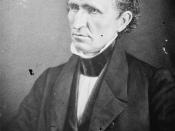With the election of 1828, came a period of New Democracy, also called Jacksonian Democracy. The attitude of the new form of democracy was that the governing was to be done directly by the people. The Jacksonian Democrats viewed themselves as the protectors of the Constitution, political democracy, individual liberty, and equality of economic opportunity. Yet, when we back at the National Bank, the Nullification disaster, and the Trail of Tears suffered by the Native Americans, the Jacksonian Democrats became involved with events that contradicted the beliefs that they claimed to follow by crushing the system of checks and balances implied in the Constitution.
The economy of the time was beneficial to Jackson, in a time where transportation helped boost commerce and the common man. The economy was turning to cash-crop agriculture and manufacturing. However, the country was beginning to split into three distinct areas; the north, south, and west.
After vetoing the charter for the United States National Bank in 1832, he claimed his reasoning for it was economic equality for his citizens. He believed that it was monopolistic and therefore unconstitutional, even though declared constitutional by the Supreme Court by the McCulloch v. Maryland case in 1819. This monopolistic bank would favor the wealthy citizens and prove detrimental to the poor citizens of America. He unsuccessfully tried to help the poorer classes by placing federal money into "pet"ÃÂ banks. However, Jackson overlooked the fact that the bank provided sound bank notes, expanded the money supply, and created a reliable currency. The bank was a safe place for the government to store and transfer it's money, but Jackson didn't see this side of the bank and demolished it using his Presidential powers. Danial Webster thought the bank was creditable. The Tariff passed in 1828 was beneficial to the north...


